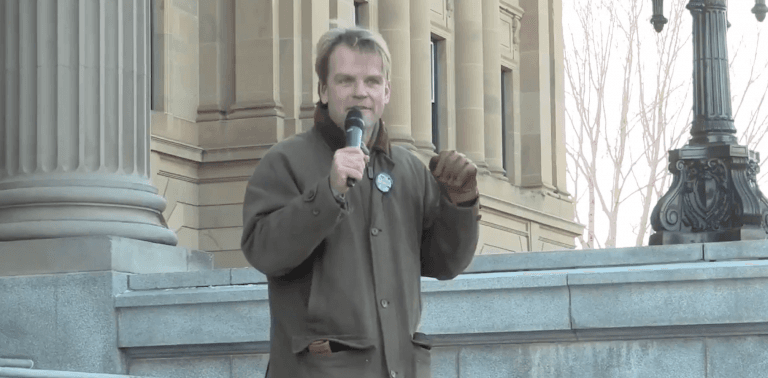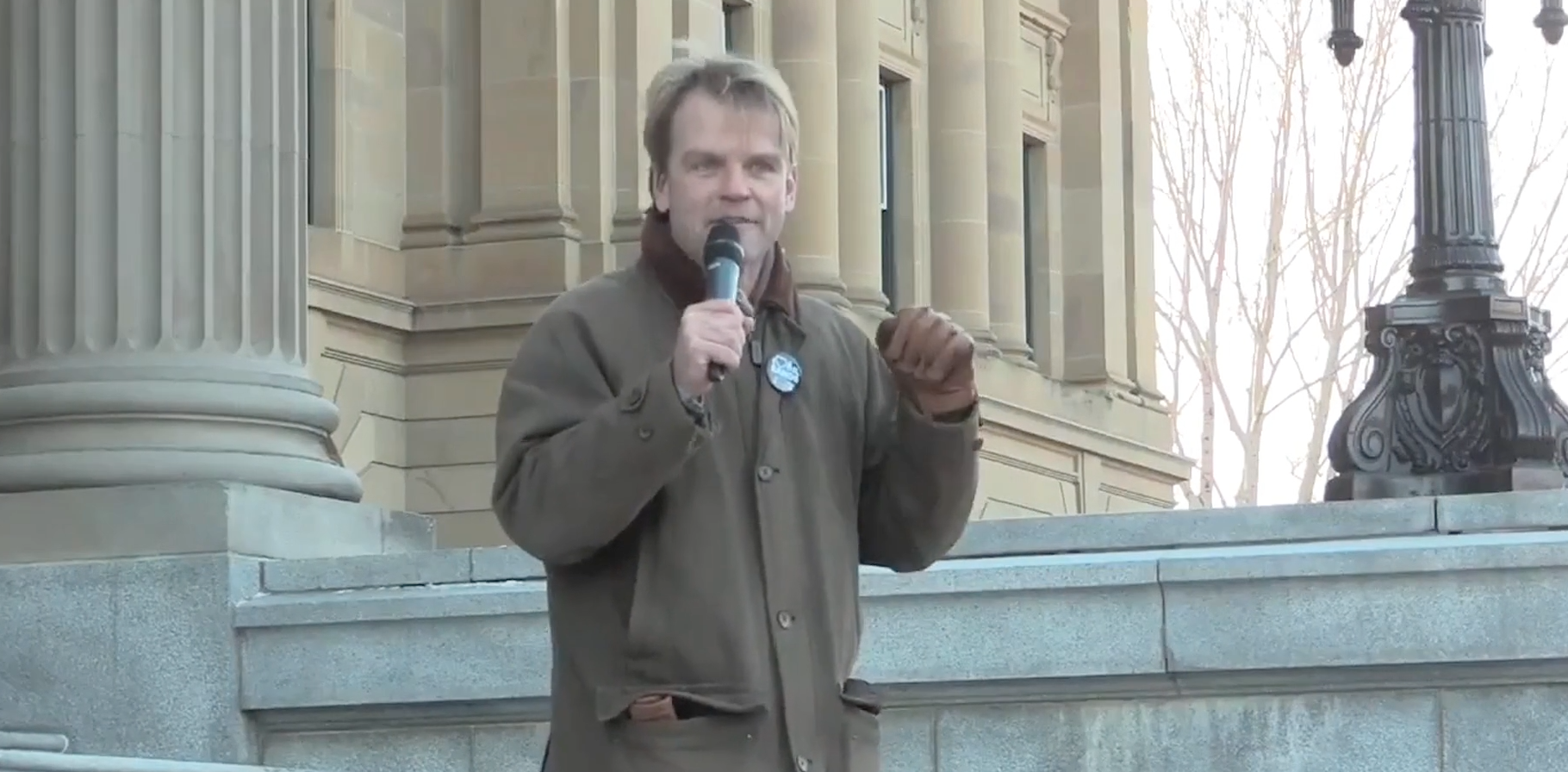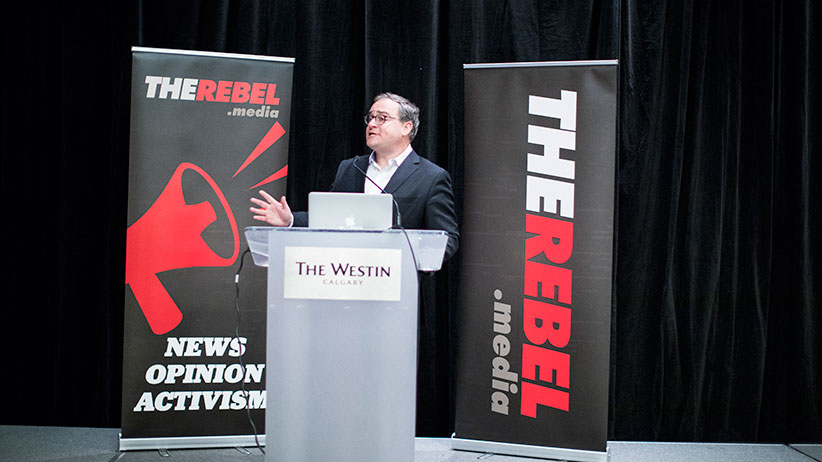Can we maintain a common Canadian decency?
Opinion: Chris Alexander on the Rebel, the media, and what Canada has done right—and must keep doing—to keep populism at bay

Chris Alexander, on the steps of the Alberta legislature for a Rally for Alberta held by Rebel Media. (Screen capture)
Share

Chris Alexander was Canada’s ambassador to Afghanistan from 2003 to 2005, deputy head of the UN mission in Afghanistan from 2005 to 2009, Canada’s minister of Citizenship and Immigration, the parliamentary secretary to the minister of National Defence and a leadership candidate for the Conservative Party of Canada.
Ever since the precipitous fall of the price of oil in 2014, Alberta’s been hurting. Big multinationals have left; thousands of oil patch jobs have disappeared; plans for pipelines to both coasts are shaky, at best. All this has derailed a decade of gains, leaving many Albertans hard-hit and bewildered.
So when Ezra Levant’s Rebel Media invited Conservative leadership candidates to a Rally for Alberta in December 2016, I hopped on a flight to Edmonton to show my support for Albertans and share my views on how the province could bounce back. From the steps of the Alberta legislature, I said this: “We can either lower our taxes, build up our industries, send energy, send the products of our agriculture and our industry around the world, or we can do the opposite—we can do what Rachel Notley is doing and send jobs overseas. We’re not going to stand for that!”
Then something totally unexpected happened: the crowd started chanting. At first, I couldn’t make out the words. But when I realized the infamous (and in my view asinine) phrase from Donald Trump’s rallies—“lock her up!”—had come to town, uninvited, my stomach leapt into my throat. (The guy who apparently initiated the chant has somewhat sheepishly explained himself here.)
I pointed my finger, grinning nervously as I played for time. Stopping a few hecklers is quite straightforward: this was a couple of thousand people chanting in unison. They repeated the phrase nine times before I summoned the presence of mind to yell “vote her out”—a much more Canadian alternative.
The chant stopped. I went on: “I know how powerful this group and millions of people across this province are going to be at the ballot box next time. And I know why you’re going to do it. (…) You believe in the low taxes, the strong economy, the high growth rates we’ve had in every generation—mostly under Conservative governments, yes! Every time government has listened to the grassroots, to the people, to the hardworking families of Alberta and Canada, that’s what gets us ahead.”
The speech ended on a great note. People were cheering. The chant had been short-lived, its hateful words replaced by faith in the power of the vote. The damage had been controlled, or so I thought, as I flew back to Toronto.
I was wrong. When I switched my phone back on after landing, it lit up with notifications, including one tweet that had already been shared hundreds of times: “Here’s the clip of @calxandr happily leading a ‘lock her up’ chant at Ezra’s rally. Lay down with pigs, Chris, you’re going to get muddy.”
The author of the tweet was Scott Gilmore—a onetime friend, colleague and “Conservative” columnist for this magazine. He also happens to be married to Justin Trudeau’s environment minister—the one responsible for the federal carbon tax and far-reaching new pipeline regulations that will keep Canada dependent on crude imports. Sadly, the political fallout for me from the media frenzy over this chant was huge—even though I didn’t start, join, or lead it, even though I’ve denounced groups that preach hatred or intolerance all my life, and even though I’ve never expressed the slightest sympathy for Trump or his brand of politics.
On the contrary, I’ve been horrified to watch this president of the United States—first as a candidate, now a world leader—make gratuitous, abusive, often hate-filled attacks on women, black, Mexican and Chinese people, the disabled, and many others including, yes, Muslims. This inflammatory and defamatory language has brought the United States into a state of disgrace. It’s made bottom-feeding hate jargon acceptable on a scale that no free and open society should ever countenance. It degrades democratic politics, and it needs to stop now.
But things didn’t stop there. When the Rebel held an anti-M-103 rally in Toronto, I made the decision to attend again—primarily to make the point that countering hatred has to include fighting terrorism, that M-103 was a “senseless, ill-worded motion that (didn’t) get at the real issues, that (sought) actually to divide us.” I also said this: “Let us make sure we are listening to what others have to say. There are Muslims in this city and elsewhere who are worried when they go to their mosques. We will stand with them, to protect their freedom to worship, their freedom of religion, their freedom to be safe from violence. We fought for that in Afghanistan and in world wars.” The event was nevertheless portrayed by some media outlets as a gathering for intolerant extremists.
Some pundits on the left have branded me “anti-Muslim”—despite having never uttered an anti-Islamic remark in my entire life and having lived, prayed, fasted, mourned and celebrated Eid, the Birth of the Prophet, Ramadan and Muharram with countless Muslim friends, including many ulema, in Canada and around the world.
The “anti-Muslim” smear against me was started, in part, by a certain Justin Trudeau who in a 2015 speech to a McGill alumni audience in Toronto (reprinted in Maclean’s) claimed that “a distinguished graduate of McGill, Minister Chris Alexander, was declaring in the House of Commons that even Rania [El-Alloul]’s hijab represented an indefensible perversion of Canadian values.”
I never said any such thing. (My actual remarks from that House of Commons exchange are here.) My wife Hedvig, who is Danish, wore a hijab through seven years in Afghanistan. As citizenship and immigration minister, I welcomed record numbers of Muslim Canadians as immigrants, refugees and new citizens.
The charge is absurd; the experience, chilling. But it gets repeated over and over. It’s the mirror image of the “globalist” label some on the right affix to politicians like me who believe in free trade, substantial immigration, refugee resettlement, foreign aid, and robust foreign and defence policies.

As for the Rebel, I don’t watch their shows. (I’ve also avoided CBC’s The National for two decades.) My many interviews with the CBC and handful with the Rebel obviously don’t imply any endorsement of either. In fact, back in mid-March I tweeted that I wouldn’t attend any more rallies after a repugnant interview the Rebel did with Gavin McInnes, which Michael Coren wrote about in the Toronto Star.
Still, how does the Rebel, which has lost even more credibility in the wake of Charlottesville, find more than 800,000 subscribers in the first place? There’s an unassuaged thirst for credible news across our country: millions of Canadians have not yet found new media that describe the world they are experiencing, that reflect their reality. Canadian Conservatives have long felt their views were not reflected in most Canadian newspapers and TV news broadcasts—with the possible exception of the Sun papers. That deep alienation gave the Rebel its opening. Now there’s room for many new voices.
But most media outlets simply treated the entire Conservative leadership campaign as a Trump campaign re-run—another romp down his profanely populist hall of mirrors. Could Kevin O’Leary “pull a Trump?” Would Kellie Leitch’s test be a “ban?” It was awful. From my perspective, it was personally telling that none of the 40 policy proposals I put forward over six months was covered in English language media (though Le Devoir did muster some interest in my ideas for “La langue de Champlain”). Instead, Canadian scribes seemed determined to view Canadian politics through an American lens.
It was a new symptom of a longer-term decline in courtesy and debate—a tide our Conservative government did not do enough to turn. We were at times tone-deaf and overly harsh; we kept our distance from the media, and were repaid in kind. In my experience, our parting of the ways with Canada’s main news organizations began in 2014—and has been worsening ever since.
Canadian politicians should care about Canadian media—about communicating well with journalists, about being open and truthful and having relationships of confidence. This is a lesson the current government has learned, for now. But the reverse is also true: journalists should show sustained concern for Canadian politicians by portraying them in human terms, as actors in the long-run drama of government, as people who set expectations, and either meet them or don’t—not voiceless hooks or statues on which to hang the labels of the day.
There is, after all, a link here: the quality of our democratic government will hinge on the ability of media in all new forms to reflect a changing political and policy spectrum, and vice versa. The best journalists will always be those whose political allegiance is a mystery to all—quite a rarity in North America today.
The bottom line is this. Canada has relatively few fringe extremist groups on the left or right fomenting hatred or promoting violence against other groups. Why? Because we have laws against hate speech and propaganda. Because over decades we’ve managed our affairs relatively well, reforming immigration, welcoming refugees, upholding the law and ensuring relatively inclusive prosperity and growth. Because we’ve had by and large a free and pluralistic media, one that has reported the news in free and multitudinous ways.
Foreign observers confirm this. Fareed Zakaria, speaking earlier this month at the Aspen Ideas Festival, said, “The one country in which (populism) is not happening is Canada. (…) Canada is the one western country that basically has no right-wing populism.” Why? Because of “good public policy” that all “parties have been willing to defend,” Zakaria concluded.
The U.S., on the other hand, is in a more painful place. We need to recognize and celebrate our advantage, while avoiding the cross-cutting forms of breakdown now afflicting our southern neighbour. This is our best defence against any virulent new strains of hate, whatever their origin.
We need to remember what Canada has done right—especially on immigration and jobs. Trump and populism are happening there, not here. Canada is different. Here we have both a government and an opposition that believe in immigration, multiculturalism, refugee resettlement, universal public health care, strong public education and gay marriage.
We need to stay curious about each other, concerned for those less fortunate, vigilant to prevent hatred, intolerance and violence, willing to listen to voices that may not always say what we want to hear, replacing incendiary identity politics with engaging policy debate.
Now, more than ever, is the time to champion common Canadian decency. We should also speak to each other more, in person. I’ll gladly join Scott Gilmore for one of his dinners, well-publicized in Maclean’s, that aim to split my party—just to hear what he and others have to say.
Maybe one day the Rebel will see the light. In the meantime, lots of smart new media outlets—from the Tyee in Vancouver to the West End Phoenix in Toronto to kukukwes.com in Atlantic Canada—are filling out the Canadian conversation.
So the challenge is simple. We as Canadians need to come down to earth—to walk much further in each other’s shoes, to “be more vile than thus, and (…) base in mine own sight,” as David says in the Old Testament. Let’s stop the name-calling: no one deserves to be compared with swine. We aren’t enemies. We have an amazing country, loved by its people and popular abroad, that has a lot more to do to be even fairer, bolder, more inclusive and more successful down the road. Let’s talk, listen, and act together, acknowledging our shared values as Canadians.
Correction: A previous version of this post suggested that Gilmore had deleted a tweet that had not been removed.